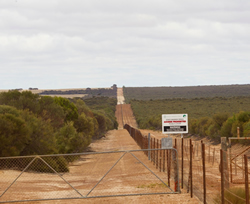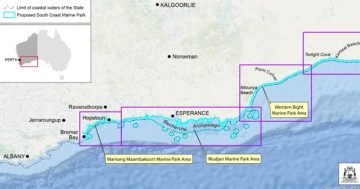 The Department of Primary Industries and Regional Development has said that work on the next phase of the Esperance extension to the State Barrier Fence is about to get under way.
The Department of Primary Industries and Regional Development has said that work on the next phase of the Esperance extension to the State Barrier Fence is about to get under way.
The extension will protect South-East farms from the depredations of wild dogs, emus and kangaroos.
It will involve 300 kilometres, over two sections, of dog-proof fencing erected from where the existing fence finishes at Coxalls Corner, north of Ravensthorpe, through to Beaumont, east of Esperance.
In a statement, the Department said the extension followed consultation, planning and biological studies guided by the Esperance Extension Reference Group, as well as an Indigenous Land Use Agreement with the Esperance Tjaltjraak Native Title Aboriginal Corporation.
“The initial phase of the project involved 74 kilometres of fencing in the Cascades area along freehold boundaries, as part of the total 660-kilometre project,” the Department said.
“We are progressing necessary approvals to finalise the remaining 286 kilometres of fencing for the Esperance Extension Project.”
It said that once completed, the extension will extend the existing State Barrier Fence which stretches from the Zuytdorp cliffs north of Kalbarri to Jerdacuttup east of Ravensthorpe, to a total length of 1,850 kilometres.
The Minister for Agriculture and Food, Alannah MacTiernan said the Esperance extension would help reduce the cost of stock losses and land degradation from wild dogs, emus and kangaroos on businesses in the South-East, enabling farmers to invest in livestock and expansion plans.
“Much work has been done on this complex project across design, construction and alignment of the fence to ensure environmental and heritage requirements are satisfied,” Ms MacTiernan said.
“We will continue to maintain the State Barrier Fence, working alongside local communities and suppliers, while progressing the Wild Dog Action Plan to optimise the potential of pastoral and farming enterprises.”



